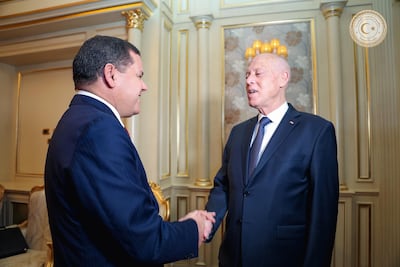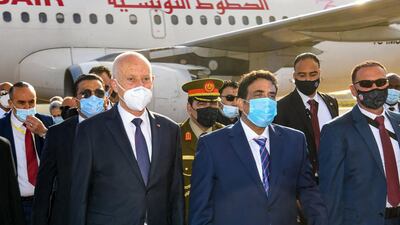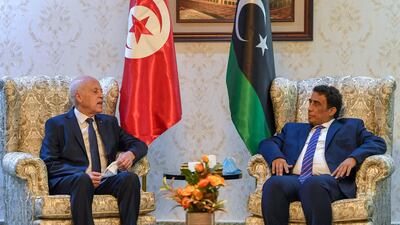Tunisia's President Kais Saied arrived in Libya on Wednesday for the first visit between the neighbouring countries since 2012, just days after the new unity government took office.
Mr Saied aims to show "Tunisia's support for the democratic process in Libya" after the swearing-in on Monday of new interim Prime Minister Abdul Hamid Dbeibah on a pledge to reunite the divided country and lead it to elections in December, the Tunisian leader's office said before the visit.
The visit also aims to "strengthen co-operation between Tunisia and Libya" and to develop solidarity for increased "stability and prosperity", his office said.
Mr Saied was welcomed at Maitiga International Airport in Tripoli by Presidential Council Chairman Mohamed Al Manfi, who affirmed the depth of relations between Libya and Tunisia.
After a meeting between the Libyan and Tunisian leaders, Mr Saied said "Libya's soil is an extension of Tunisia's soil, and our history is full of unity."
They announced a high committee between the two nations will discuss a variety of mutually important issues in the coming days.
During the meeting, Mr Saied raised the cases of Tunisian journalists Nadhir Ktari and Sofiane Chourabi, who went missing in 2014.
Months after their disappearance, officials from the Government of National Accord said that an ISIS-linked group had executed the two journalists.
Tunisia hosted UN-backed talks between representatives of Libya's warring factions late last year that helped to pave the way for the fragile breakthrough.
Before Libya's descent into chaos after the 2011 overthrow of veteran dictator Muammar Qaddafi in an uprising that sparked a Nato intervention, the oil-rich country was a major customer for Tunisian farm produce and building materials as well as migrant labour.
The long years of conflict resulted in prolonged border closures that hit the volume of business, particularly in the informal trade in consumer goods that is an economic mainstay in border areas.
Successive Tunisian governments strove to avoid publicly taking sides between Libya's rival administrations in the east and west that fought themselves to a bloody standstill before making way this week for the new UN-backed unity government led by Mr Dbeibah.

The common front fell apart briefly last year when the current Tunisian president accused the Islamist Ennahda party, which forms the largest bloc in parliament, of being too close to the authorities in western Libya in their Turkish-backed war against the eastern-based Libyan National Army led by Field Marshal Khalifa Haftar.







